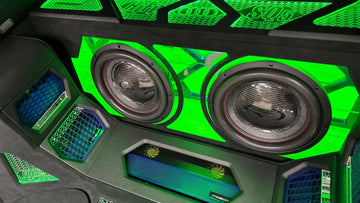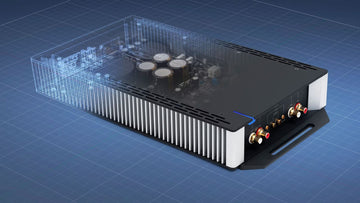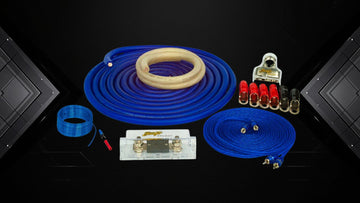
Free Shipping

Award Winning Products

Expert Support

30-Day Money Back Guarantee
Quick Decision Guide
| Your Priority | Best Choice | Why This Works | Installation | Budget Range | Sound Quality |
|---|---|---|---|---|---|
|
Best Sound Quality
|
Component | Separate drivers optimize each frequency | Complex | $200-$1500+ | Excellent |
|
Easy Upgrade
|
Coaxial | Drop-in factory replacement | Simple | $50-$400 | Very Good |
|
Budget Friendly
|
Coaxial | All-in-one design reduces cost | DIY Friendly | $50-$200 | Good |
|
Custom Install
|
Component | Flexible tweeter placement | Professional | $300-$2000+ | Outstanding |
|
Quick Results
|
Coaxial | Immediate improvement, no wiring changes | 30 minutes | $80-$300 | Very Good |
🏆 Component Speakers
The Audiophile Choice
✅ Component Speaker Advantages:
- 🎯 Superior Sound Quality: Separate woofer and tweeter optimize frequency response
- 🎛️ Flexible Installation: Mount tweeters in optimal locations (A-pillars, dash, doors)
- 🔧 Professional Tuning: External crossovers provide precise frequency control
- 🏆 Upgrade Path: Can add amplifiers and advanced tuning later
- 🎵 Soundstage: Creates wider, more realistic stereo imaging
⚠️ Component Speaker Considerations:
- Installation Complexity: Requires running tweeter wires and mounting locations
- Higher Cost: More components mean higher price point
- Professional Install Recommended: Best results need proper tweeter placement
- Space Requirements: Need room for crossovers and separate drivers
🎯 Perfect For:
Serious audio enthusiasts, custom car audio builds, users planning amplifier and frequency response upgrades, and those wanting maximum sound quality can benefit from professional installation options.
🚗 Coaxial Speakers
The Smart Upgrade
✅ Coaxial Speaker Advantages:
- 🚗 Easy Installation: Drop directly into factory speaker locations
- 💰 Cost Effective: Single unit design keeps prices reasonable
- ⚡ Quick Results: Immediate sound improvement in 30 minutes
- 🔌 Factory Compatible: Work perfectly with factory head units
- 🛠️ DIY Friendly: No complex wiring or custom mounting needed
⚠️ Coaxial Speaker Considerations:
- Sound Compromise: Tweeter position fixed by woofer location
- Frequency Interaction: Drivers can interfere with each other
- Limited Soundstage: Less precise stereo imaging than components
- Upgrade Limitations: Harder to fine-tune system later
🎯 Perfect For:
First-time upgraders, budget-conscious buyers, and those looking for factory system improvements with superior sound quality will find simple DIY installation options appealing.
🎯 Find Your Perfect Speaker Type
Question 1: What's Your Primary Goal?
Question 2: Installation Preference?
Question 3: Budget Range?
Shop By Type
Choose the speaker configuration that matches your installation goals
Understanding speaker types is crucial for achieving your desired sound quality. Component systems offer the ultimate in performance with separate drivers optimized for specific frequency ranges, while coaxial speakers provide excellent sound in a convenient all-in-one design. Individual drivers allow for custom system building and targeted upgrades to existing installations.
Separate woofers, tweeters, and crossovers for ultimate sound staging and audiophile performance
MATCH MS 62C 6.5 Component Speaker System
Ground Zero GZIC 13X 5″ 2-way component speaker system
Rainbow Audio EL-C260S 6.5" 2-Way Component Speakers Set
Ground Zero GZIC 16X 6.5″ 2-way component speaker system
Image Dynamics ID65CS Component System
Polk DB5252 5.25" Component Speaker System with Marine Certification
Rainbow Audio SL Pro C260 Component Set
Feelart SQ-6.5G 6.5" 2-Way Car Speaker System | Audio Intensity
AudioCircle Stuttgart Line 6.5" 2-way component speakers
Rainbow Audio EL-C6.2P 2-Way 6.5" Component Set
MATCH MS 52C 5-1/4" Component Speaker System
Eton PRS165.2 2-Way 6.5" Component System
Audio Dynamics 2000 Series 5.25″ Component Set – CS524
Eton POW13 5" 2-Way Component System
Dynaudio Esotan 212 2-Way Component System
Image Dynamics CXS64 V2 6.5” Component Set
Audio Dynamics ADC624 6.5" Component Speaker Set
Eton POW 172.2 165 mm (6.5 inch) 2-way component system
Eton POW 100.2 4″ 2-Way Component System
Audiocircle Hamburg Line 6.5″ 2-way component speakers
Eton RSE 160 6.5" 2 Way Component Set
ETON UG B100 W2 Component Set
Rainbow Audio SL-C260 2-Way 6.5” Component Set
Eton POW16+ 2-Way 6.5" Component System
Dynaudio Esotan 232 MKII 165mm 2-way component system
Eton POW20+ 2-Way 8" Component System
Eton PRS165.3 3-Way 6.5" Component System
Eton POW 200.2 200 mm (8 inch) 2-way component system
Rainbow Audio GL-C6.3 3 way 6.5" / 3" / 20mm Component Set
Eton PRO16+ 2-Way 6.5" Component System
Eton MB100F Mercedes 4" 2-Way Plug and Play Upgrade
Rainbow Audio AE-30TH 2-Way Component Car Speakers- Limited Edition
Crescendo REVOLUTION 3S3 3 way speaker system
Rainbow Audio GL-C6.2 2 way 6.5" / 26mm Component Set
Crescendo Revolution 5S3 3-way speaker system
Crescendo REVOLUTION 7S3 3 way speaker system
Full-range speakers with integrated tweeters for easy installation and balanced sound
Audio Dynamics ADCX413 4" Coaxial Speaker Set
Xcelsus XP620 Primum 6.5" 2 Way Coaxial Set
Polk DB462 4x6" Coaxial Speakers with Marine Certification
Eton PRX 110 100 mm (4 inch) coaxial system
Ground Zero GZIF 40X 4″ 2-way coaxial speaker system
Polk DB402 4" Coaxial Speakers with Marine Certification
Xcelsus XP620 Primum 6.5" 2 Way Coaxial System
Rainbow Audio EL-X165S 2-Way 6.5-inch (165mm) Coaxial Speakers
Audio Dynamics ADCX513 5.25" Coaxial Speaker Set
Audio Dynamics 2000 Series 5.25″ Coaxial Set – CX524
Eton PRX 140.2
Audiocircle SL-X6 6.5" 2-Way Coaxial Speakers
Arc Audio X2 502 5.25" Coaxial Speaker Set
Audio Dynamics ADCX613 6.5" Coaxial Speaker Set
Audio Dynamics ADCX6914 6x9" Coaxial Speaker Set
Audiocircle FL-X6 6.5" Coaxial Speakers Set
Xcelsus XU620 Ultra Series 6.5" Coaxial Set
Eton PSX10 4" Coaxial System
Eton PSX13 5.25" Coaxial System
Dynaudio Esotan 212C 2-Way Coaxial Set
Audio Dynamics ADCX6923 6x9" Coaxial Speaker Set
Audio Dynamics 3000 Series 6.5″ Coaxial Set
Eton PRX 170.2 165 mm (6.5 inch) coaxial system
Eton MB100CNX Mercedes 4" Coaxial Plug and Play Upgrade
Eton PSX16 6.5" Coaxial System
Eton B 100 X W2 Coax system - Pair
Eton MB100RX Mercedes 4" Coaxial Plug and Play Upgrade
Arc Audio Moto CX6 6.5" Coaxial Speaker Set
Arc Audio Moto602-HD 6.5" Coaxial Speaker System
Eton MB100PX Mercedes 4" Coaxial Plug and Play Upgrade
Eton RSX80 3" Coaxial System
High-frequency drivers for upgrading existing systems or custom component builds
Kicker CS Series CST20 3/4 inch Tweeter Set
Mirus M.75 20mm Titanium Tweeter Pair
Hybrid Audio Imagine Series Tweeters
Xcelsus XPLT28W – PRIMUM SERIES SQL WAVEGUIDE TWEETER
Hybrid Audio Legatia X1 Tweeters - Silver | Previous Display
Dynaudio Esotec MD 102 Soft Dome Tweeter - Pair
Xcelsus XXT30 – Competition Series 30mm Tweeter
Xcelsus XXT30W – Competition Series 30mm WaveGuide Tweeter
XCELSUS XUST30W SQL Waveguide Tweeter - Previous Display
Xcelsus XXT30W – Previous Demo
Dynaudio Esotec MD 102 Tweeters | Previous Display
Rainbow ML-TW16s AD/A6 Matrix Line 16mm Silk Dome Tweeter for Audi
Rainbow ML-TW16s AD - Dedicated Automatic Lifting and Ambient Tweeter - Audi
Rainbow ML-TW25C MB - Ceramic Dome Rotating Tweeter for Mercedes-Benz S-Class
Dedicated mid-frequency drivers for advanced multi-way component systems
Xcelsus XPLM6 – PRIMUM Series SQL Midbass/Midrange
Rainbow SL-PRO-MD80 3" Midrange
AudioCircle Hamburg Line 3" Midrange speakers MK II
Eton PRW80 3" Midrange Driver
Xcelsus XUSM6 6.5″ Midrange / Midbass Driver
Eton PRO80 3" Midrange Driver
Eton RSE80 3" Midrange Driver
Xcelsus XXM325 – Competition Series 3 inch Midrange Driver
Xcelsus XXM425- Competition Series 4 inch midrange speakers
Xcelsus XUSM8 Ultra SQL Series 8″ MIDRANGE DRIVER
Hybrid Audio Legatia X3 3" Fullrange Driver - Pair (Previous Display)
Hybrid Audio Legatia X6 7" Woofer / Midrange - Pair (Previous Display)
Xcelsus XXM425- Competition Series 4 inch midrange pair | Previous Demo
Eton RSR 80 3" Midrange Driver
Powerful low-mid frequency drivers for enhanced bass impact and dynamic range
Xcelsus XPLM6 – PRIMUM Series SQL Midbass/Midrange
Hybrid Audio Legatia L6v2
Xcelsus XUSM6 6.5″ Midrange / Midbass Driver
Xcelsus XUSM8 Ultra SQL Series 8″ MIDRANGE DRIVER
Rainbow Audio PL-W6C 6.5" 165mm Mid Woofer Crystal Cone
Audio Dynamics 5000 Series 6.5″ Mid Woofer – MW65
Xcelsus XXM875 8" Competition Midbass - Pair | Previous Demo
Mercedes Subwoofer Upgrade - Eton MB195L Footwell Subwoofer
Dynaudio Esotec MW 172 8 inch mid bass speaker - Pair

Component & Coaxial Options
Complete System Solutions Choose from high-performance component systems with separate crossovers for ultimate sound staging, or premium coaxial speakers for simplified installation without compromising quality.

Proven Reliability
Built for Automotive ExtremesEngineered to withstand temperature fluctuations, humidity, and vibration. Our speakers maintain consistent performance through years of daily driving and extreme conditions.

Multiple Size Options
Perfect Fit for Every Vehicle Available in popular sizes from 3.5" to 6x9" including 5.25", 6.5", and component systems. Our comprehensive sizing ensures optimal performance whether upgrading factory speakers or building custom installations.

Advanced Driver Technology
Precision-Engineered ComponentsOur speakers feature premium materials like aramid fiber woofers, silk dome tweeters, and butyl rubber surrounds. Every component is selected for optimal frequency response and long-term durability in automotive environments.
Shop By Size
Find speakers that fit your vehicle's factory locations perfectly
Speaker size directly impacts both fitment and performance in your vehicle. Larger speakers generally produce deeper bass and higher output, while smaller speakers excel in tight factory locations. Most vehicles use multiple speaker sizes throughout the cabin - smaller drivers in dash locations and larger speakers in doors or rear decks. Choosing the correct size ensures optimal acoustic performance while maintaining proper mounting and clearance.
Compact solutions for dash locations and smaller vehicles
Xcelsus XXM325 – Competition Series 3 inch Midrange Driver
Eton RSR 80 3" Midrange Driver
Eton RSX80 3" Coaxial System
Rainbow SL-PRO-MD80 3" Midrange
Eton PRO80 3" Midrange Driver
Feelart 3" Coaxial Full Range Driver - Pair
Hybrid Audio Legatia X6 7" Woofer / Midrange - Pair (Previous Display)
Hybrid Audio Legatia X3 3" Fullrange Driver - Pair (Previous Display)
Eton RSE80 3" Midrange Driver
AudioCircle Hamburg Line 3" Midrange speakers MK II
Eton PRW80 3" Midrange Driver
Balanced performance for tight factory locations
Image Dynamics ID4 ID Series 4-inch Coaxial
Audio Dynamics ADCX413 4" Coaxial Speaker Set
Eton PRX 110 100 mm (4 inch) coaxial system
Ground Zero GZIF 40X 4″ 2-way coaxial speaker system
Polk DB402 4" Coaxial Speakers with Marine Certification
Eton PSX10 4" Coaxial System
Eton MB100CNX Mercedes 4" Coaxial Plug and Play Upgrade
Eton POW 100.2 4″ 2-Way Component System
Eton MB100RX Mercedes 4" Coaxial Plug and Play Upgrade
Xcelsus XXM425- Competition Series 4 inch midrange speakers
ETON UG B100 W2 Component Set
Xcelsus XXM425- Competition Series 4 inch midrange pair | Previous Demo
Eton MB100PX Mercedes 4" Coaxial Plug and Play Upgrade
Eton MB100F Mercedes 4" 2-Way Plug and Play Upgrade
Popular size offering excellent sound quality and wide vehicle compatibility
MATCH MS 52C 5-1/4" Component Speaker System
Eton PSX13 5.25" Coaxial System
Eton POW13 5" 2-Way Component System
Audio Dynamics ADCX513 5.25" Coaxial Speaker Set
Arc Audio X2 502 5.25" Coaxial Speaker Set
Audio Dynamics 2000 Series 5.25″ Component Set – CS524
Polk DB5252 5.25" Component Speaker System with Marine Certification
Audio Dynamics 2000 Series 5.25″ Coaxial Set – CX524
Ground Zero GZIC 13X 5″ 2-way component speaker system
Oval format speakers for specific factory applications and rear deck installations
Audio Dynamics ADCX6914 6x9" Coaxial Speaker Set
The enthusiast favorite - optimal balance of performance and fitment
Eton GR160 Speaker Grille for 6.5" Woofers / Midrange
Xcelsus XP620 Primum 6.5" 2 Way Coaxial Set
Image Dynamics ID65 ID Series 6.5 inch Coaxial
Xcelsus XP620 Primum 6.5" 2 Way Coaxial System
Rainbow Audio EL-X165S 2-Way 6.5-inch (165mm) Coaxial Speakers
Rainbow Audio EL-C260S 6.5" 2-Way Component Speakers Set
Audiocircle SL-X6 6.5" 2-Way Coaxial Speakers
Ground Zero GZIC 16X 6.5″ 2-way component speaker system
Audio Dynamics ADC614 6.5" Component Speaker Set
Image Dynamics ID65CS Component System
Audio Dynamics ADCX613 6.5" Coaxial Speaker Set
Audiocircle FL-X6 6.5" Coaxial Speakers Set
Xcelsus XU620 Ultra Series 6.5" Coaxial Set
Xcelsus XPLM6 – PRIMUM Series SQL Midbass/Midrange
Feelart SQ-6.5G 6.5" 2-Way Car Speaker System | Audio Intensity
AudioCircle Stuttgart Line 6.5" 2-way component speakers
Eton PRS165.2 2-Way 6.5" Component System
Rainbow Audio EL-C6.2P 2-Way 6.5" Component Set
Triton SX6D4 6.5" Dual 4-Ohm Subwoofer
Audio Dynamics 3000 Series 6.5″ Coaxial Set
Dynaudio Esotan 212 2-Way Component System
Eton PRX 170.2 165 mm (6.5 inch) coaxial system
Xcelsus XUSM6 6.5″ Midrange / Midbass Driver
Hybrid Audio Legatia L6v2
Image Dynamics CXS64 V2 6.5” Component Set
Eton PSX16 6.5" Coaxial System
Audio Dynamics ADC624 6.5" Component Speaker Set
Eton POW 172.2 165 mm (6.5 inch) 2-way component system
Xcelsus XP6.2 6.5" 2-way Component Set
Audiocircle Hamburg Line 6.5″ 2-way component speakers
Arc Audio Moto CX6 6.5" Coaxial Speaker Set
Arc Audio Moto602-HD 6.5" Coaxial Speaker System
Rainbow Audio PL-W6C 6.5" 165mm Mid Woofer Crystal Cone
Rainbow Audio SL-C260 2-Way 6.5” Component Set
Eton POW16+ 2-Way 6.5" Component System
Eton PRS165.3 3-Way 6.5" Component System
Dynaudio Esotan 232 MKII 165mm 2-way component system
Eton POW20+ 2-Way 8" Component System
Rainbow Audio GL-C6.3 3 way 6.5" / 3" / 20mm Component Set
Audio Dynamics 5000 Series 6.5″ Mid Woofer – MW65
Eton PRO16+ 2-Way 6.5" Component System
Rainbow Audio AE-30TH 2-Way Component Car Speakers- Limited Edition
Crescendo REVOLUTION 3S3 3 way speaker system
Rainbow Audio GL-C6.2 2 way 6.5" / 26mm Component Set
Crescendo Revolution 5S3 3-way speaker system
Maximum output for rear deck installations and larger vehicles
Image Dynamics ID69 ID Series 6x9 inch Coaxial
Audio Dynamics ADCX6914 6x9" Coaxial Speaker Set
Audio Dynamics ADCX6923 6x9" Coaxial Speaker Set
Audio Dynamics 2000 Series 6″x 9″ Mid Woofer
Cicada CH69.4 6×9″ Coaxial Horn Speakers
High-output drivers for serious bass impact and dynamic range in larger installations
Eton POW20+ 2-Way 8" Component System
Xcelsus XXM875 8" Competition Midbass - Pair | Previous Demo
Mercedes Subwoofer Upgrade - Eton MB195L Footwell Subwoofer
Xcelsus XUSM8 Ultra SQL Series 8″ MIDRANGE DRIVER
Eton POW 200.2 200 mm (8 inch) 2-way component system
Related Products
Complete Your Car Audio System
System Upgrades
Complete Audio Packages Professionally matched speaker and amplifier combinations
Component System Packages - Speakers, amplifiers, and installation accessories Full-Range Upgrade Kits - Complete front/rear speaker replacement solutions Custom Installation Services - Professional setup for optimal performance
Master the Science Behind Superior Automotive Sound
All About Car Speakers
Choosing the right car speakers transforms your daily drive into an immersive audio experience.At Audio Intensity, we don't just sell speakers – we provide the knowledge you need to make informed decisions. Whether you're upgrading from factory speakers or building a complete audiophile system, understanding these fundamentals will elevate your car audio game.
🔊 Component vs Coaxial: The Complete Guide
Understanding the fundamental differences and when to choose each type
Discover why component systems deliver superior sound staging and when coaxial speakers are the perfect choice for your installation.
📐 Speaker Sizing and Fitment Guide
Matching the right speaker size to your vehicle and listening goals
Learn how speaker size affects performance and ensure perfect fitment for your specific vehicle model.
⚡ Power Handling and Amplifier Matching
Optimizing speaker and amplifier combinations for maximum performance
Master RMS vs peak power ratings and discover how proper matching delivers clean, dynamic sound.
🎯 Installation Best Practices
Professional techniques for optimal speaker performance
Learn placement strategies, wiring techniques, and sound dampening methods that separate amateur from professional results.
🔧 Tweeter Types and Materials
Understanding dome materials and their impact on sound quality
Explore silk, metal, and ceramic tweeter technologies and their unique sonic characteristics.
📊 Frequency Response and Sound Staging
Creating the perfect acoustic environment in your vehicle
Understand crossover design, driver placement, and acoustic principles that create lifelike sound reproduction.
Get Answers to Your Car Speaker Questions
Frequently Asked Questions
What's the difference between component and coaxial speakers?
Component speakers use separate woofers, tweeters, and crossovers for superior sound staging and audiophile performance. Coaxial speakers combine all drivers in one unit for easier installation while still delivering excellent sound quality. Components are ideal for serious listening, while coaxials offer great performance with simpler installation.
How do I know what size speakers fit my vehicle?
Check your owner's manual, measure existing speakers, or use our vehicle compatibility guide. Most cars use multiple sizes - typically smaller speakers (3.5"-5.25") in dash locations and larger speakers (6.5"-6x9") in doors or rear deck. We provide fitment information for popular vehicle models.
Can I mix different speaker brands in my car?
While possible, we recommend using speakers from the same manufacturer for consistent sound signature and tonal balance. Mixing brands can create uneven frequency response and poor sound staging across your vehicle's cabin.
Are car speakers difficult to install?
Most coaxial speakers are straightforward replacements requiring basic tools. Component systems are more complex, involving separate tweeter mounting and crossover installation. We provide detailed installation guides, and professional installation is recommended for component systems.
Do I need an amplifier for aftermarket speakers?
While aftermarket speakers will improve sound over factory units even with factory power, adding an amplifier significantly enhances performance. Amplifiers provide cleaner power, better dynamics, and allow speakers to reach their full potential.
What's the difference between peak and RMS power ratings?
RMS (Root Mean Square) represents continuous power handling - the real-world power a speaker can handle safely. Peak power is a marketing number representing short bursts. Always match RMS ratings when selecting amplifiers and speakers.
Why do some speakers sound harsh or bright?
Harshness usually results from poor tweeter quality, incorrect crossover points, or installation positioning. Our speakers use premium silk dome tweeters and properly engineered crossovers to deliver smooth, natural high frequencies without fatigue.
How can I improve bass response without a subwoofer?
Choose larger speakers (6.5" or 6x9") with quality midbass drivers, ensure proper speaker enclosure (sealed door panels), and add sound dampening to reduce vibrations. However, dedicated subwoofers are still the best solution for deep bass extension.
What causes speaker distortion?
Distortion typically comes from overpowering speakers, poor amplifier quality, or damaged drivers. Our speakers are designed with robust power handling and high-quality components to minimize distortion even at higher volumes.
Related Articles
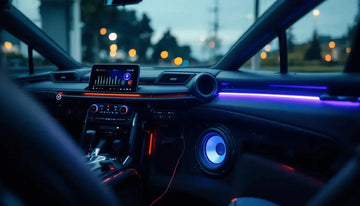
Loudspeakers for Cars: Complete Guide to Upgrading Your Vehicle’s Audio System
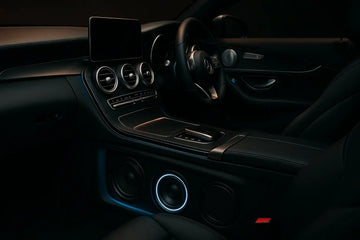
Best Car Sub and Speakers for Every Budget in 2025
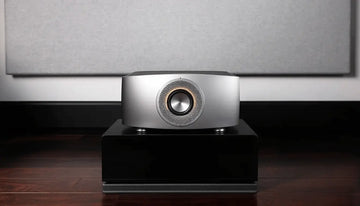
Best Focused Speaker Technology for Superior Sound Precision





















































































































